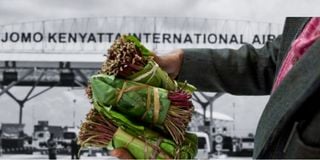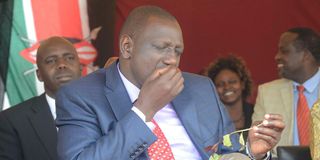
The collection of a miraa ‘commission’ at the Jomo Kenyatta International Airport (JKIA) has been ongoing since July 2022.
For every kilogramme of miraa exported to Somalia by air, a faceless cartel believed to have backing from the government pockets Sh581.89 ($4.50).
This translates to more than Sh10 million per day at the current exchange rate since Kenya exports about 20 tonnes of khat daily.
The collection of this ‘commission’ at the Jomo Kenyatta International Airport (JKIA) has been ongoing since July 2022 when former President Uhuru Kenyatta and his Somalia counterpart Hassan Mohamud entered into a deal that ended a two-year ban on miraa exports. In the deal, the amount of miraa exported to Mogadishu was capped at 20 tonnes per day down from more than 50 tonnes that was being sold pre-Covid-19 pandemic.
It has since emerged that besides the Somali government imposing the daily quota of 20 tonnes on Kenyan khat, exporters were also required to pay Sh581.89 per kilo before their cargo could leave Kenya. Yet, this levy was not captured in any trade agreement before the exports resumed.
According to an official who worked in the Ministry of Agriculture at the time, the ‘commission’ was agreed on among top government officials from both sides.
“The money goes to very powerful officials. They collect millions of shillings daily at the expense of miraa farmers,” he said on condition of anonymity, citing sensitivity of the matter.
Illegal levy
In 2022, the Nyambene Miraa Trade Association (Nyamita) had raised the alarm over how the illegal levy was being strictly enforced.
“No miraa can leave JKIA if the exporter has not paid the ‘commission’. The airlines have clear instructions to enforce collection of the money. When we complained in 2022, we were asked whether the farmers’ money was involved,” a trader told the Nation.
The resumption of miraa exports to Somalia also marked the beginning of government regulation on khat trade through the Agriculture and Food Authority (AFA).
According to AFA, Kenya exported 3.13 million kilogrammes of miraa to Somalia in 2022 and 6.26 million kilos in 2023. This means that the faceless cartel collected at least Sh1.8 billion in 2022 and some Sh3.6 billion in 2023 as per the current dollar exchange rate.
According to Meru Senator Kathuri Murungi, the Ministry of Trade has formally confirmed the collection of the ‘commission’ at JKIA but could not do anything about it.
“I sought a statement from the Trade Ministry but the Cabinet Secretary said the matter is beyond his office. The Ministry recommended that we seek the president’s intervention. It is unfortunate that money is illegally collected in Kenya yet the government cannot do anything,” Mr Murungi said.
He said the cartel is so deeply entrenched that efforts by the Kenyan Ambassador in Somalia to seek a solution had hit a dead end.
Ruto's promise

Then Deputy President William Ruto chews miraa during a past meeting with farmers at Maili Tatu Stadium, Igembe Central Constituency.
In September 2022, President William Ruto, while attending a prayer meeting in Maua, Meru, promised to smoke out the cartel to save miraa farmers from anguish.
“Immediately I am sworn in as President of the Republic of Kenya, I will deal with the cartel. Let them be put on notice,” Mr Ruto told a congregation after listening to the pleas of miraa farmers.
However, two years later, exporters continue to pay the ‘commission’, which has implications on miraa trade, including levies and pricing.
While the daily quota and the commission are seen as measures by the Somali government to control consumption of khat, others see it as an attempt by traders to create artificial demand to earn a premium price.
“In Mogadishu, Kenyan khat can retail for up to Sh5,000 per kilo yet the farmer gets meagre pay. This is because of the costly conditions imposed on the export market,” Mr Murungi said.
Nyamita Spokesman Kimathi Munjuri observed that the ‘commission’ was intertwined with the export market to Mogadishu.
“We believe this is a condition to limit the number of people who can afford miraa in Somalia. Our observation is that it may not be possible to stop collection of the commission,” Mr Munjuri said.
But Meru County Agriculture Chief Officer James Mutia said the Miraa-Muguka Pricing Committee should play its role to ensure fair trade.
“The committee was established because of unfair business practices. They should be able to study the market and recommend prices that benefit the farmer,” Mr Mutia said.
Miraa traders and farmers in Meru County are now appealing to President Ruto to honour his pledge to smoke out a cartel collecting $4.50 at JKIA.











